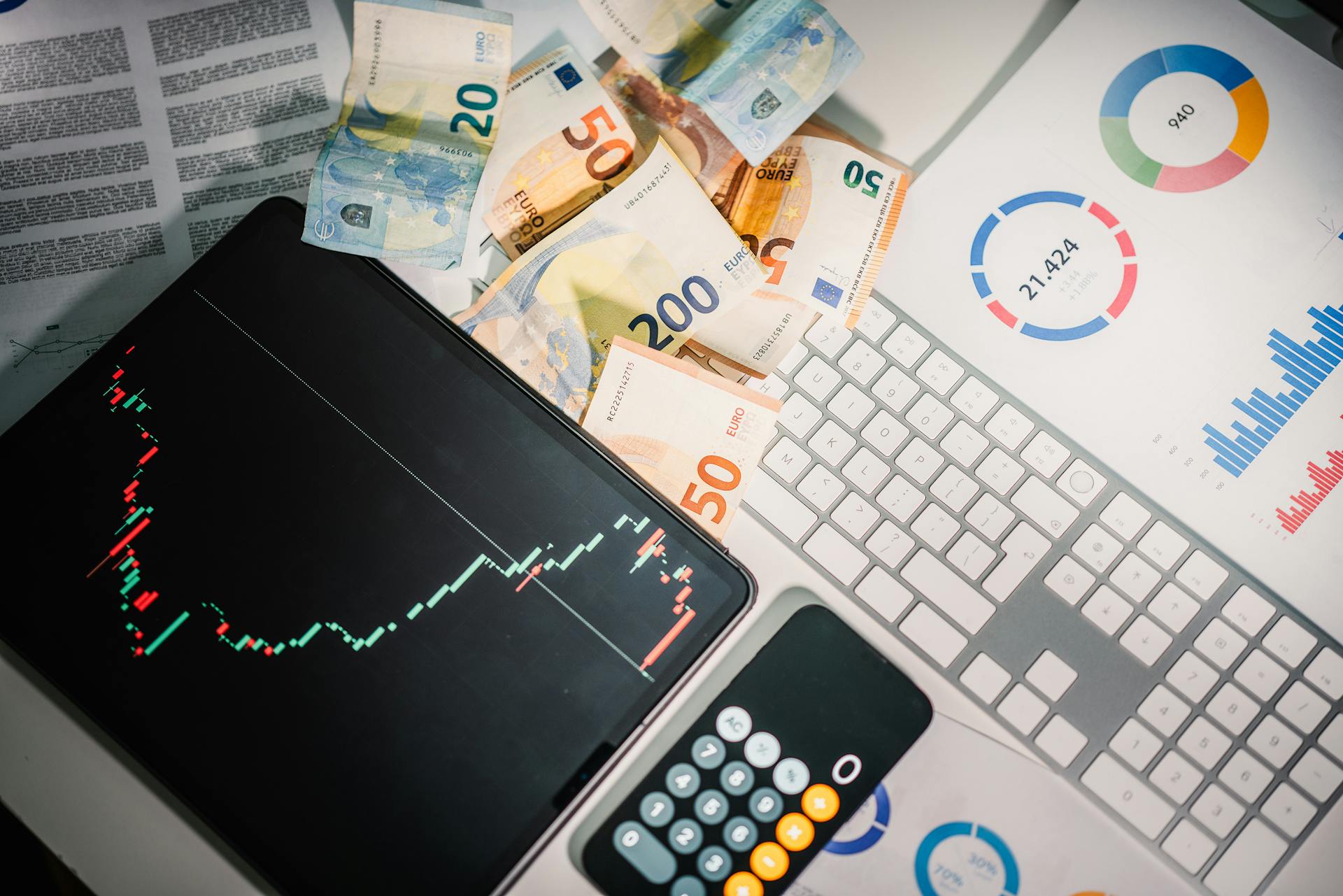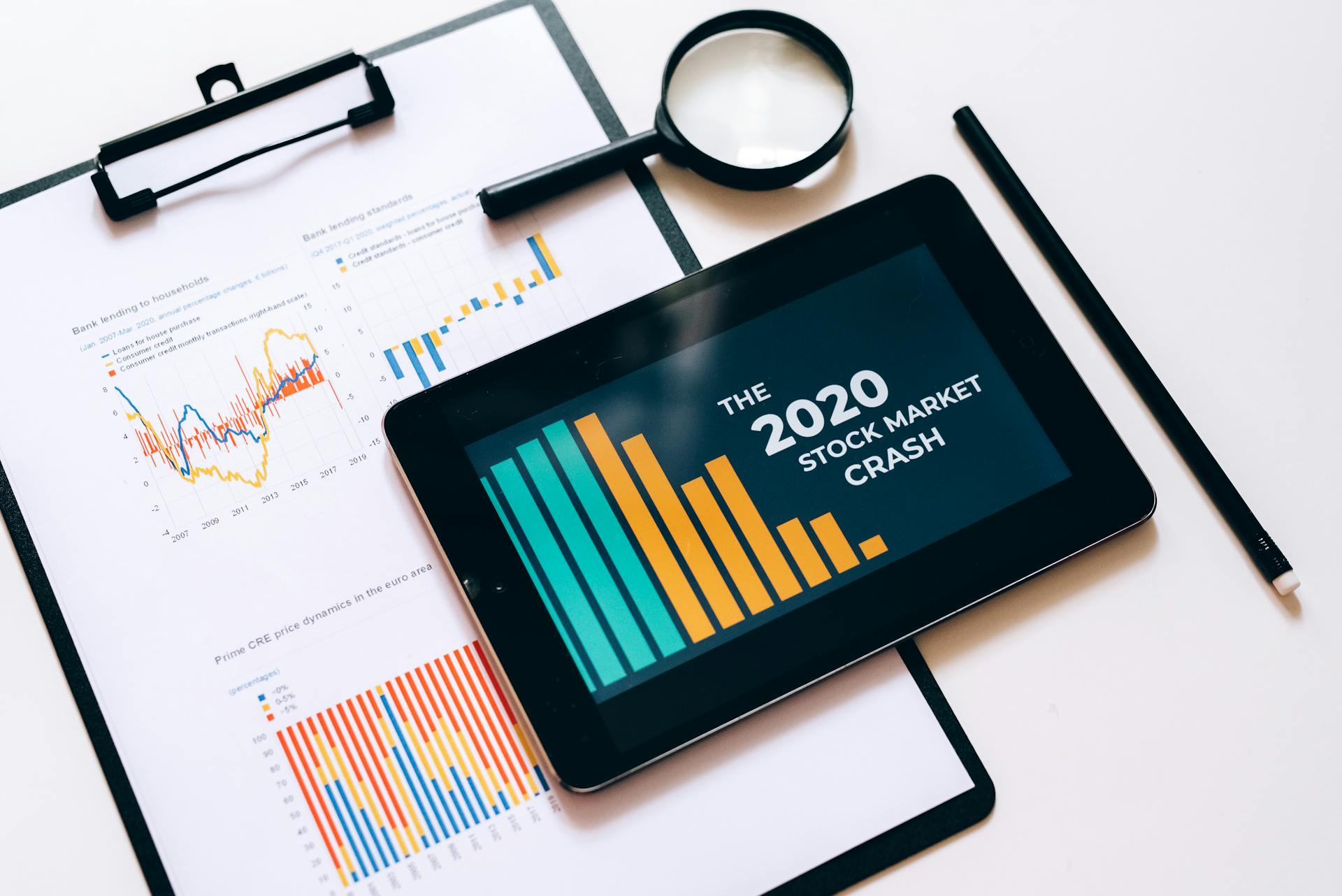
Companies with share buybacks can be a bit confusing, but let's break it down. A share buyback is when a company uses its own money to buy back its own shares from investors.
This can be a clever way for companies to return value to their shareholders, as we'll see with Apple's buyback plan. By buying back shares, companies can reduce the number of shares outstanding, which can increase the value of each remaining share.
Companies like Microsoft and Google have also used share buybacks to reward their investors.
Consider reading: Why Do Companies Buy Back Shares of Their Own Stock
Why Companies Engage in Share Buybacks
Companies engage in share buybacks for several reasons. One key reason is that they have more money than they need to invest in their business, and buying back shares gives shareholders extra cash to invest elsewhere.
Investing extra cash can be a smart move for companies with excess funds. By buying back shares, they can put that money to work for their shareholders.
Companies may also buy back shares if they think they're undervalued. This can be a way for them to get good value for their money and potentially boost their stock price.
Buying undervalued stock is a common strategy for companies looking to maximize their returns. By buying back shares at discounted prices, they can increase their stock price over time.
Restoring share value is another reason companies engage in share buybacks. When employees exercise stock options, it can dilute the value of existing shares. Buybacks can help balance this out and maintain the company's share value.
Companies want to maintain a balance between debt and equity financing, and buybacks can help them achieve this balance. By reducing shareholder equity, they can keep their debt-to-equity ratio in check.
Share buybacks can drive up a company's stock price, which can result in a higher price-to-earnings (P/E) multiple. This can make their stock more attractive to investors, who may be willing to pay a premium for it.
Discover more: Shares and Equity
Impact on Company Value and Finances
Companies with share buybacks often see an increase in their share price after announcing a buyback. This is because people think the buyback is good news, and a popular explanation is that with fewer shares around, each share gets a bigger piece of the profit pie, leading to higher earnings per share.
A share repurchase can have a significant impact on a company's value, but it doesn't magically increase the overall value of the company. Instead, it's like cutting a pizza into fewer slices – each slice gets bigger, but the pizza itself doesn't get bigger.
The biggest impact of a share repurchase is on per-share measures of profitability and cash flow, such as earnings per share (EPS) and cash flow per share (CFPS). For example, if a company repurchases 10% of its outstanding shares, its EPS can increase by 12%, as seen in the example of Birdbaths and Beyond (BB).
Additional reading: Share Split Example
A company's P/E multiple can also increase over time as investors recognize the positive impact of share repurchases on EPS. This can lead to a higher share price, as seen in the example of BB, where the stock price increased by 24% after a buyback.
Share repurchases can also affect a company's financial statements, reducing outstanding shares and consequently shrinking shareholders' equity. However, buybacks are not recorded as an expense on the income statement, but rather affect the published EPS figure.
Companies with high buyback ratios, such as those in the S&P 500 Buyback Index, have consistently outperformed other indices, with an annual return of 33.65% over the past 30 years. This is because share repurchases indicate a company's confidence in its future prospects and its belief that its stock is undervalued.
Global Share Buyback Trends
In the US, share buybacks have been on the rise since 2010, with companies such as Apple, Microsoft, and Google allocating a significant portion of their cash reserves towards repurchasing their own shares.
According to data from S&P Global, the total value of US share buybacks has exceeded $1 trillion in a single year, with 2018 being the highest at $1.07 trillion.
The largest share buyback in history was conducted by Apple in 2012, where the company repurchased $17.6 billion worth of its own shares.
Share buybacks are often seen as a way for companies to boost their stock prices and reward shareholders.
In some cases, companies use share buybacks as a means to return cash to shareholders, such as in the case of Google, which repurchased $10.7 billion worth of its own shares in 2018.
The trend of share buybacks is not unique to the US, with companies in other countries also taking part in this practice.
Check this out: Share Buy Back Rules
Pricing and Terms of Share Buybacks
When considering the pricing and terms of a share buyback, the board's paramount consideration is the best interests of the organization and its constituencies. This means carefully weighing short- and long-term considerations, which can sometimes conflict.
Price considerations can vary significantly based on a number of factors, such as the number of shares to be repurchased, funding sources, and securities law implications. The board will want to carefully document their considerations in minutes of the meetings where the repurchase considerations take place.
Pricing for the repurchase of a large block of shares can differ from that of small lots, and non-SEC companies face a particular challenge in establishing pricing terms. Shareholder expectations of value can make this process even more difficult.
The board should receive input from disinterested and objective financial professionals when pricing the buyback program to ensure the best interests of the organization are represented. This helps to mitigate potential manipulation issues and other legal concerns.
Establishing the funding source is a crucial aspect of pricing and terms, as it can impact the length of time the program will be in place and accounting treatment.
Suggestion: Share Repurchase Plan
Securities and Insider Trading
Securities and Insider Trading can be a complex issue for companies with share buybacks. Material non-public insider information can significantly impact a company's ability to undertake a buyback program.
Companies with share buybacks need to be aware of potential pending regulatory and credit issues, management changes, and other potentially material matters that can impact the value of the company.
A buyback program followed by an acquisition of the issuer at a higher price than was offered can be problematic. This is especially true if the acquisition is completely unexpected.
Board-established trading windows can also impact a company's ability to repurchase shares. This can lead to questions from remaining shareholders about the price paid for the repurchased shares.
Certain complex safe harbor opportunities for buybacks exist under federal securities laws and exchange-based requirements. However, these opportunities can also lead to tender offer issues and "going private" issues.
Repurchased shares, whether held in treasury or as authorized but unissued shares, require registration or an exception from registration if they are resold or reissued.
Check this out: Penny Share Trading
Individual Company Examples
Charter Communications has been reducing its share count since 2016, shrinking from 270 million shares to about 153 million shares today. This reduction has led to a significant increase in earnings per share, growing at an average annual rate of 12%.
PulteGroup has also been reducing its share count, decreasing from 287 million shares in 2017 to about 226 million shares in 2022, a reduction of 21%. This reduction has led to a significant increase in earnings per share, growing from $2.24 in 2017 to $11.01 in 2022.
AutoZone has been aggressively buying back its own stock, reducing its share count from 66 million shares in 2007 to just 19 million shares in 2022. This reduction has led to a significant increase in earnings per share, making shares very attractive for long-term investors.
Here are some key statistics on the companies mentioned:
Lowe's has also been reducing its share count, decreasing from 1.24 billion shares in 2011 to 670 million shares in 2021, a reduction of almost half. This reduction has led to a significant increase in earnings per share, making shares attractive for long-term investors.
Apple's Previous Buybacks Compared
Apple isn't new to large buybacks, having done a $100 billion buyback in 2018.
They continued this trend from 2021 to 2023 with annual buybacks of $90 billion each year.
This shows that Apple sees buybacks as an effective way to distribute profits to shareholders.
By choosing big annual buybacks over larger dividends, Apple keeps things flexible.
Apple's approach allows them to respond to the company's performance each year, rather than committing to ongoing payments.
Readers also liked: Apple Share Holding
Charter Communications
Charter Communications has been reducing its share count since 2016, whittling it down from 270 million shares to about 153 million shares.
This reduction has led to a significant increase in earnings per share, growing at an average annual rate of 12% since 2016, compared to total earnings growth of 6.2% annually.
Charter has authorization to purchase about $400 million in shares, which at current prices could be another 1.2 million shares.
The company's stock has responded positively to this strategy, rising from about $175 to $350, a neat double, although it peaked at over $800 in the summer of 2021.
Buying back shares can be a successful strategy for long-term investors, but it's essential to consider the underlying business fundamentals and potential risks.
Charter operates in a competitive and rapidly changing industry, with fierce competition and technological advancements posing significant challenges.
The company's reliance on debt to fund stock buybacks is also a concern, especially with interest rates rising across the board.
Here's a summary of Charter's share buyback activity:
Note: The exact numbers for 2021 and 2016 are not specified in the article section.
Key Takeaways
A share repurchase, also known as a "buyback" or "float shrink", refers to a company purchasing its own stock shares in the marketplace. This move usually indicates that the firm is bullish about its future earnings potential.
A share repurchase can have a significant positive impact on an investor's portfolio. If done correctly, it can boost the value of existing shares.
Share repurchases can experience a huge impact on profitability measures, such as earnings per share (EPS). This is because the company is essentially reducing the number of shares outstanding, which can lead to higher earnings per share.
Readers also liked: Share Buyback Yield
Because the value of a share repurchase depends on the stock's future price, buybacks come with more uncertainty than dividends. This means that investors need to carefully evaluate the potential risks and rewards before investing.
Here are some key statistics to consider:
Frequently Asked Questions
Does Nike do share buybacks?
Yes, Nike has a stock buyback plan in place, which authorizes $18 billion in share repurchases between 2022 and 2026. The company has already spent $1.18 billion on stock buybacks from June to August this year.
Is it good when a company buys back shares?
When a company buys back shares, it can increase earnings per share and return cash to shareholders who want to exit the investment, but only if the shares are purchased at a price lower than their true value. This can be a positive move for remaining shareholders, but the outcome depends on various factors.
Does Coca-Cola do stock buybacks?
Yes, Coca-Cola regularly conducts stock buybacks, with recent quarterly buybacks totaling $74 million. Coca-Cola's stock buyback program is a regular practice to return value to shareholders.
What did Warren Buffett say about stock buybacks?
Warren Buffett only buys back shares when they're considered a "bargain", at a price below the company's intrinsic value. He looks for a discount to the long-term worth of Berkshire's assets.
Sources
- https://poole.ncsu.edu/thought-leadership/article/apples-planning-a-110b-stock-buyback-heres-why/
- https://www.janushenderson.com/en-us/advisor/press-releases/global-share-buybacks-surge-to-a-record-1-31-trillion-almost-equalling-dividends/
- https://www.vorys.com/publication-Stock-Buybacks-for-Banks-and-Bank-Holding-Companies
- https://www.investopedia.com/articles/investing/112013/impact-share-repurchases.asp
- https://www.kiplinger.com/investing/stocks/604441/stocks-rewarding-investors-with-generous-buybacks
Featured Images: pexels.com


